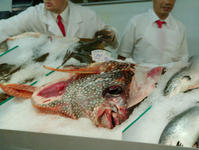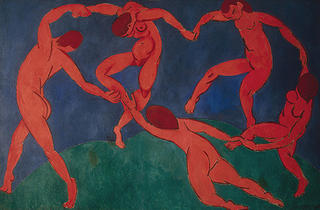Or so concludes my partner in crime, who read the movie reviews for me again this week. He read aloud,
"The movie leaves us with the grateful realization that, for a man, love and trouble are worth having more than anything, and it ends with a triumphant double coda that brings the sexual jokes down to earth with a touch of sexual realism (nicely put, Denby) and then sends them off again with a flight of lyrical fancy." (103)
This after last week's abject sexual bitterness! Granted, they are different movies, but . . . this is Denby reviewing Judd Apatow's 40-Year Old Virgin. Hmmm . . . .
The man lets his identification with the cinema take the foreground. And, after all, that's a nice, honest way to expose the ideological position from which you are writing, which is what I am, recently, asking Acocella to do too. Again, see the very insightful comment to my July post
"I'm not particularly hot . . ." We've been watching the TV show Freaks & Geeks here and director Apatow is quite genius with uncomfortable, klutzy romance. That scene where Nick sings to Lindsay . . . ow, that hurts.
As for Denby's approval of Luc Jacquet's March of the Penguins, I myself dislike anthropomorphic readings of nature films. [I also don't like people's relationships to their pets. But that is because I live near
Frick Park, and if I try to take a little run or walk after a day of work people's leash-less dogs come up to me and sniff my crotch. And the people yell to the dog, and I want to scream at them, your dog does not understand language! At least not at this moment . . . Besides, no matter how much these people identify with or overfeed their pets, the dogs will always be faster than them and able to approach my crotch without restraint, unless they wear a leash, as obligated by law. But these people are too lazy to walk the extra few yards to the enclosed leash free area. I used to think communities were nice, but there is a community consensus that people with dogs can use the park in this way and I find it intimidating. Enough.] Back to polar love. Again, Denby praises the film's warm fuzzy moments, and identifies with the romance of the birds as he places himself right in the middle of the romantic drama, when the penguins,
"find a partner, they stand with heads bowed before each other in what appears to be silent adoration. If we are moved, are we experiencing what they are feeling or what we are feeling?" (103)
Awwwww . . . .
On another rant, am I the only person in the world who found the last blockbuster French bird doc, Jacques Perrin's Winged Migration to be nationalistic? What with the birds dying in post-Soviet industrial waste, or mowed down by tractors in the US and then finding timeless bird paradise in the French countryside, where a little boy in peasant dress and a HUGE GOLD CROSS SPARKLING IN THE SUN runs through an idyllic meadow?
Finally, Red Eye, directed by Wes Craven. I think I'll try to see this. I love movies that place in very enclosed spaces. And I love scary movies and these categories overlap quite a bit to create my very favorite movies.
Note the irony. If you click on my
Frick Park link, after a long intro, you will see the quote, "Parks are the most Democratic spaces in society." Mob rule is more like!!!
Categories: film, Pittsburgh, newyorker, outdoors














